
Full Stack Developer vs Software Engineer: Must-Know Insights
Mar 28, 2025 6 Min Read 6790 Views
(Last Updated)
Are you looking to build a successful career in tech but confused between the highly rewarding roles of a full stack developer and software engineer?
In the tech industry, the roles of Full Stack Developer and Software Engineer are pivotal, yet they differ in scope, responsibilities, and expertise.
Understanding these differences is crucial for professionals looking to chart their career paths and for organizations aiming to hire the right talent for specific needs.
In this article, I will give you a detailed comparison of the Full Stack Developer vs Software Engineer roles, providing a comprehensive guide for all you need to know to build a career in these roles in 2025.
Table of contents
- Key Responsibilities
- Full Stack Developer
- Software Engineer
- Full Stack Developer vs Software Engineer
- Required Skills
- 1) Technical Skills
- 2) Soft Skills
- Tools and Technologies
- Full Stack Developer
- Software Engineer
- Career Path and Growth Opportunities
- Full Stack Developer
- Software Engineer
- Industry Demand and Salary Comparison
- Demand
- Salary Comparison
- Takeaways...
- FAQs
- Is a full stack developer better than a software engineer?
- Who gets paid more, full stack developer or software engineer?
- Can a full stack developer work as a software engineer?
- Which full stack has the highest salary?
- Do full stack engineers use Python?
Key Responsibilities
Full Stack Developer
A Full Stack Developer is a multi-skilled professional responsible for both client-side (front-end) and server-side (back-end) development. This role requires a holistic understanding of the entire technology stack, allowing the developer to create fully integrated web applications.
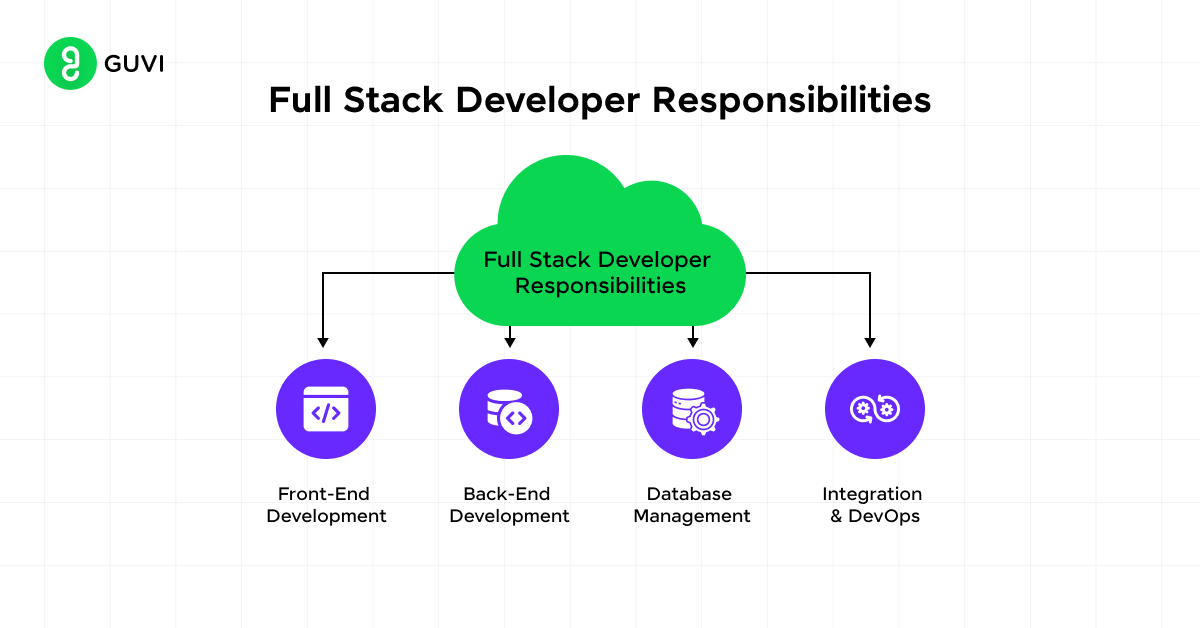
- Front-End Development:
- Technologies: Mastery of HTML5, CSS3, JavaScript, and modern frameworks such as React, Angular, or Vue.js.
- For example, a Full Stack Developer could build a dynamic and responsive user interface using React, ensuring cross-browser compatibility and optimizing for performance.
- Additional Responsibilities: Handling UI/UX design aspects, ensuring a seamless user experience, and implementing responsive design to cater to mobile devices.
- Back-End Development:
- Technologies: Proficiency in server-side languages like Python, Java, or Node.js, and frameworks such as Django, Flask, or Spring Boot.
- For example, developing a RESTful API using Django, managing user authentication, and ensuring secure data transactions.
- Additional Responsibilities: Integration with databases (e.g., PostgreSQL, MongoDB), managing server configurations, and optimizing server-side processes for speed and efficiency.
- Database Management:
- Relational Databases: Full Stack Developers often use SQL for relational databases like MySQL or PostgreSQL.
- NoSQL Databases: They may also work with NoSQL databases like MongoDB or Cassandra, especially when dealing with unstructured data.
- Like designing a database schema in PostgreSQL to manage user data efficiently, implementing complex queries, and ensuring data integrity through transactions.
- Integration & DevOps:
- Technologies: Continuous Integration/Continuous Deployment (CI/CD) tools like Jenkins, GitHub Actions, or Docker for containerization.
- For example, implementing a CI/CD pipeline to automate testing and deployment, ensuring that new features are quickly and reliably delivered to production.
Software Engineer
A Software Engineer focuses on the design, development, and optimization of software systems. They often work on larger, more complex systems and may specialize in specific areas such as backend development, systems engineering, or software architecture.
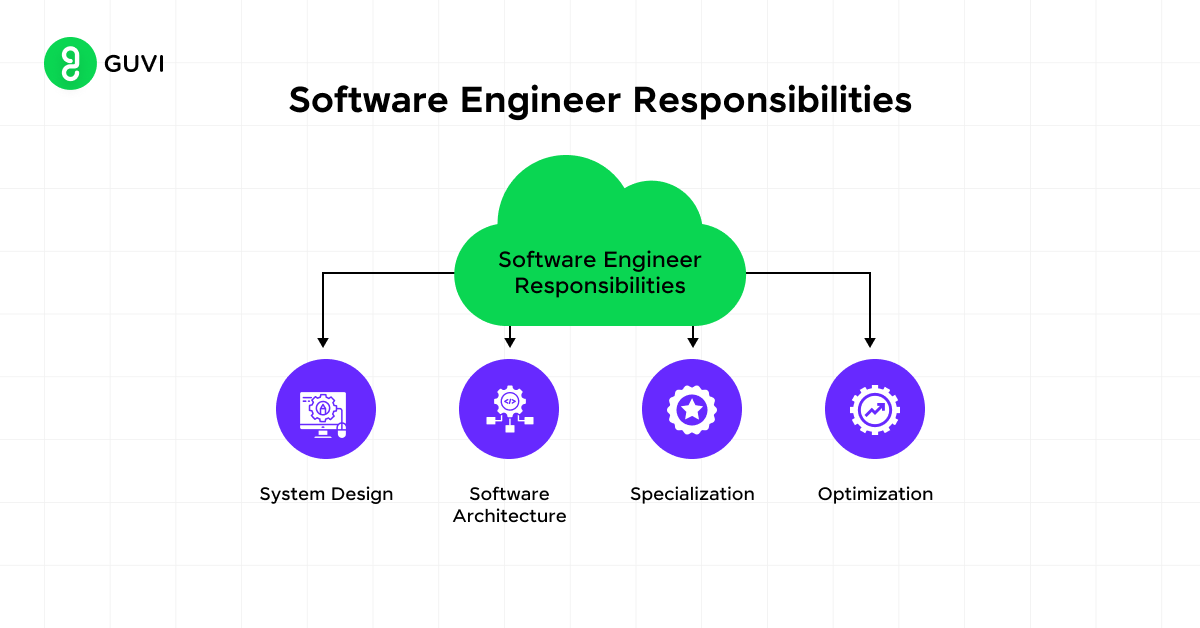
- System Design:
- Principles: Knowledge of design patterns, SOLID principles, and architectural styles like microservices, event-driven architecture, and monolithic architectures.
- They might need to develop a microservices-based architecture for an e-commerce platform, ensuring that each service is loosely coupled, scalable, and can be independently deployed.
- Additional Responsibilities: Creating high-level design documents, working on system scalability, and ensuring fault tolerance and high availability.
- Software Architecture:
- Technologies: Use of UML diagrams, architectural patterns like MVC (Model-View-Controller), and tools like Enterprise Architect or Lucidchart for visualization.
- Like architecting a distributed system with a focus on scalability, using load balancers, caching mechanisms (e.g., Redis), and distributed databases (e.g., Cassandra).
- Additional Responsibilities: Ensuring that the architecture aligns with business goals, balancing trade-offs between performance, security, and maintainability.
- Specialization:
- Areas of Expertise: Software Engineers might specialize in areas such as machine learning, cybersecurity, or cloud computing.
- For example, a Software Engineer specializing in machine learning might develop and deploy models using TensorFlow or PyTorch, integrating them into a production environment.
- Additional Responsibilities: Continuous learning and adapting to new technologies, contributing to open-source projects, and mentoring junior engineers.
- Optimization:
- Techniques: Profiling and optimizing code, reducing technical debt, and improving system performance.
- Using profiling tools like JProfiler or VisualVM to identify bottlenecks in a Java application, optimizing memory usage, and reducing processing time.
- Additional Responsibilities: Conducting code reviews, writing efficient algorithms, and implementing caching strategies to enhance performance.
Do you want to become a full stack developer but earning all this from scratch doesn’t seem that simple? Need proper guided help?
Then take a rightly paced approach with updated syllabi, tools, and industry-grade projects with GUVI’s Full Stack Development Course brought to you by expert full stack developers!
Full Stack Developer vs Software Engineer
| Aspect | Full Stack Developer | Software Engineer |
| Focus | End-to-end web application development | System design, optimization, and specialized development |
| Technologies & Frameworks | Front-end: HTML, CSS, JavaScript (React, Angular)Back-end: Python, Java, Node.js (Django, Spring Boot) | Depends on specialization: e.g., C++, Java for systems engineering, TensorFlow for ML |
| Database Management | SQL, NoSQL (PostgreSQL, MongoDB) | Deep understanding of database internals, optimization, and data consistency |
| System Design | Integration of front-end and back-end through REST APIs or GraphQL | Microservices, distributed systems, high-level architectural design |
| Optimization | Code refactoring, performance tuning on both client and server sides | Profiling, memory management, algorithm optimization |
Required Skills
1) Technical Skills
A) Full Stack Developer
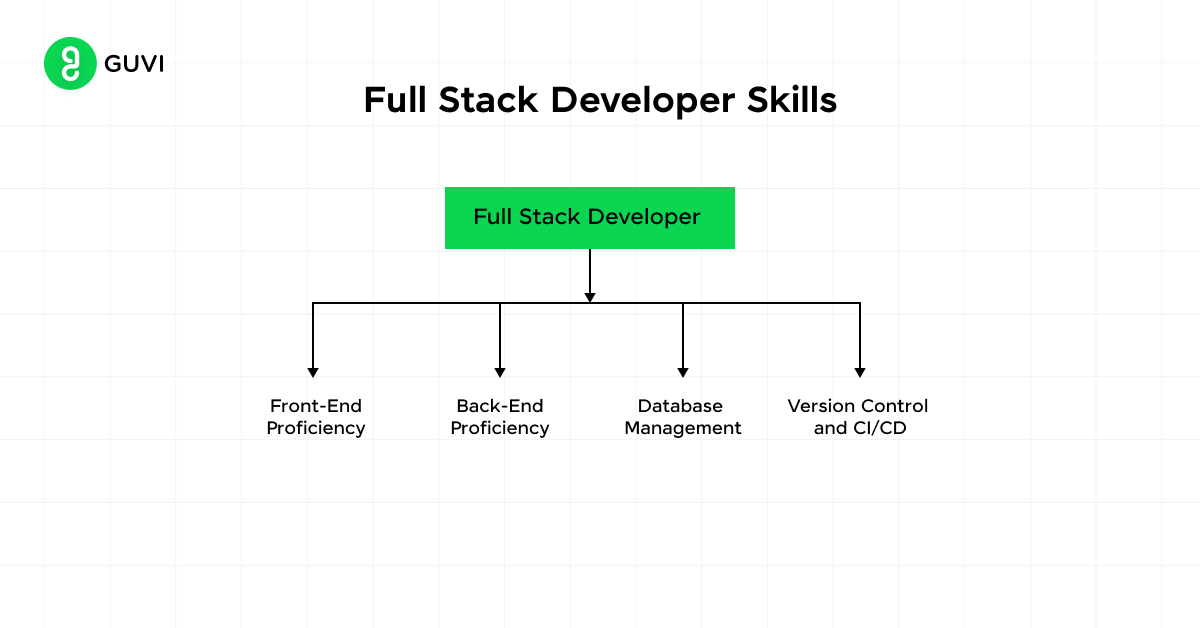
- Front-End Proficiency:
- Key Skills: Mastery of HTML, CSS, JavaScript, and experience with modern JavaScript frameworks like React, Angular, or Vue.js.
- Example: A Full Stack Developer might use React to build a complex, interactive UI component that seamlessly integrates with a back-end API.
- Advanced Techniques: Implementing state management with Redux, using TypeScript for type safety, and optimizing front-end performance through lazy loading and code splitting.
- Back-End Proficiency:
- Key Skills: Strong understanding of server-side languages such as Python, Java, or JavaScript (Node.js) and their respective frameworks like Django, Spring Boot, or Express.js.
- Example: Developing a robust REST API with Django, handling user authentication, data validation, and secure transaction processing.
- Advanced Techniques: Implementing OAuth2 for secure API access, using GraphQL for flexible data queries, and optimizing database queries for performance.
- Database Management:
- Key Skills: Experience with relational databases (SQL) and NoSQL databases, understanding of indexing, and query optimization.
- Example: Designing a normalized database schema in MySQL, implementing stored procedures, and optimizing queries using indexes.
- Advanced Techniques: Implementing database replication for high availability, using Redis for caching, and understanding the CAP theorem to balance consistency, availability, and partition tolerance in distributed databases.
- Version Control and CI/CD:
- Key Skills: Proficiency with Git for version control, experience with CI/CD tools like Jenkins or GitHub Actions.
- Example: Setting up a CI/CD pipeline to automate testing and deployment of a web application.
- Advanced Techniques: Implementing infrastructure as code (IaC) with tools like Terraform, automating deployments with Docker and Kubernetes, and managing environments using Helm charts.
B) Software Engineer
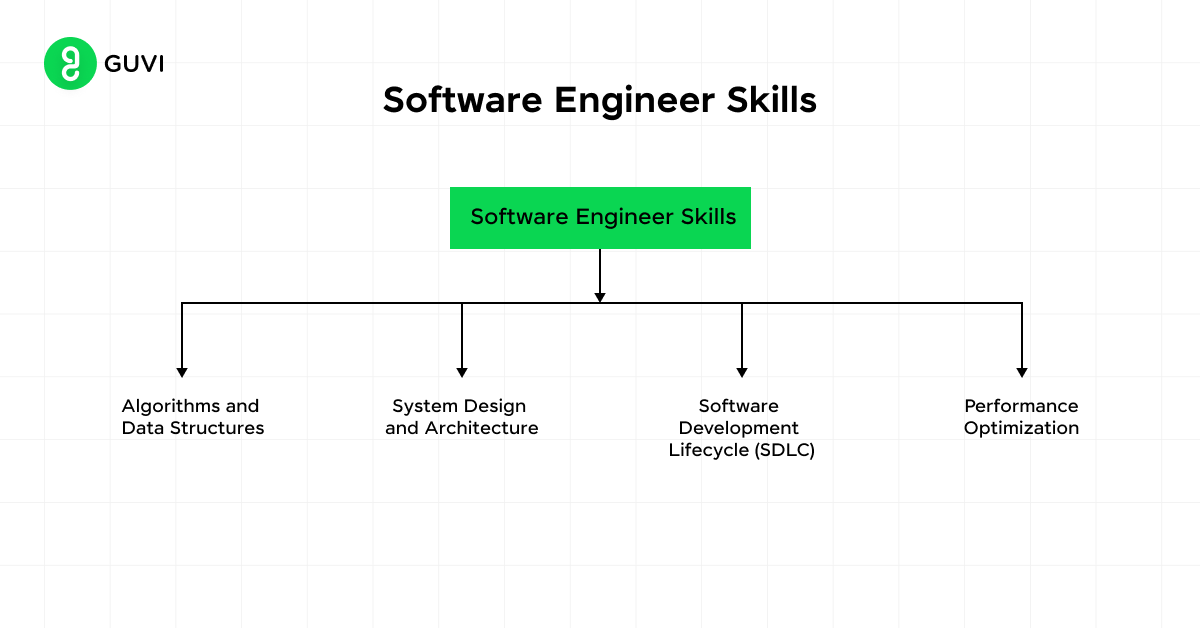
- Algorithms and Data Structures:
- Key Skills: Deep understanding of algorithms, data structures, and their application in solving complex problems.
- Example: Implementing a binary search algorithm to optimize search operations in a large dataset.
- Advanced Techniques: Developing custom data structures for specific use cases, optimizing algorithms for time and space complexity, and using dynamic programming to solve problems efficiently.
- System Design and Architecture:
- Key Skills: Proficiency in designing scalable systems, understanding of architectural patterns, and experience with cloud platforms like AWS, Azure, or Google Cloud.
- Example: Designing a microservices architecture for a large-scale application, using API gateways, service discovery, and load balancing.
- Advanced Techniques: Implementing event-driven architectures with Kafka, designing systems for eventual consistency in distributed environments, and using serverless architectures to scale on demand.
- Software Development Lifecycle (SDLC):
- Key Skills: Knowledge of the SDLC, from requirements gathering to deployment and maintenance.
- Example: Leading a software project through all stages of development, ensuring that each phase meets quality standards.
- Advanced Techniques: Implementing DevOps practices, using tools like Jenkins for CI/CD, and applying Agile methodologies to manage iterative development cycles.
- Performance Optimization:
- Key Skills: Experience in profiling and optimizing code, understanding of concurrency, and memory management.
- Example: Using profiling tools to identify bottlenecks in a multithreaded application and optimizing the code for better performance.
- Advanced Techniques: Implementing parallel processing, optimizing garbage collection in Java, and reducing latency in real-time systems through network optimizations.
2) Soft Skills
Both roles require strong soft skills, which are essential for effective collaboration, problem-solving, and communication in complex technical environments.
- Problem Solving:
- Application: Full Stack Developers must solve end-to-end problems, such as debugging a front-end issue that is linked to a back-end API call. Software Engineers might tackle more complex issues, like designing a fault-tolerant system that can handle millions of transactions per second.
- Communication:
- Application: Clear communication is crucial, especially when explaining technical concepts to non-technical stakeholders or collaborating with other teams. Full Stack Developers often communicate across the stack, while Software Engineers may focus on their specialized area but need to convey their designs and decisions clearly.
Tools and Technologies
Full Stack Developer
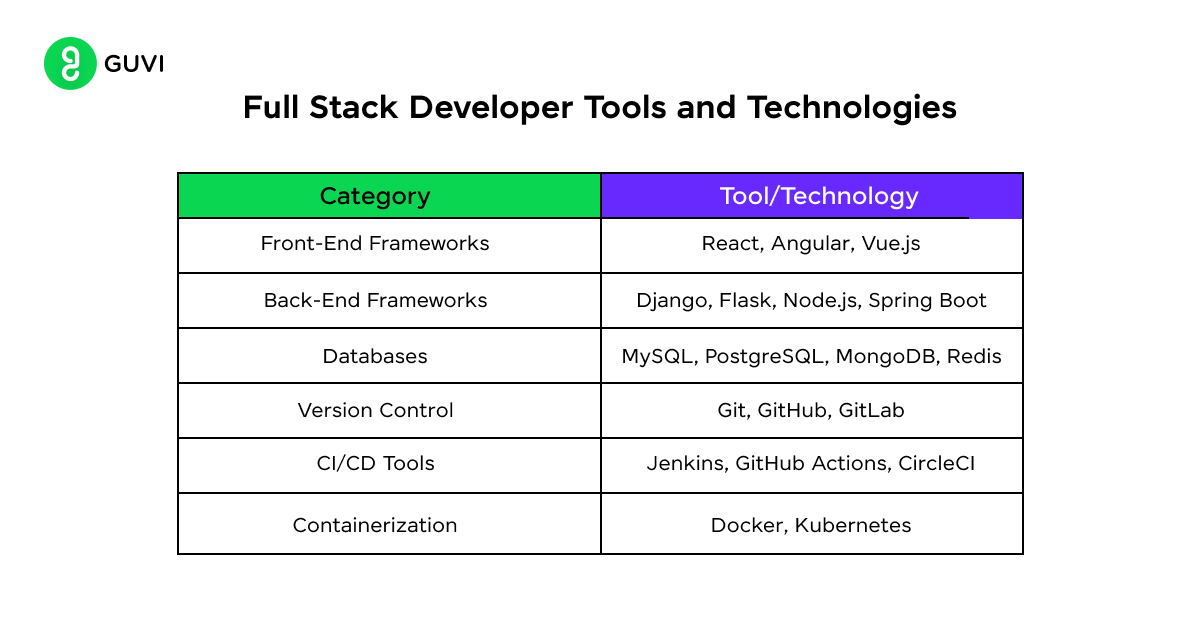
A Full Stack Developer needs a wide array of tools and technologies across both front-end and back-end development. The following table outlines the key tools and technologies, their functions, and examples.
| Category | Tool/Technology | Function | Example |
| Front-End Frameworks | React, Angular, Vue.js | Build dynamic user interfaces | Developing a Single Page Application (SPA) with React |
| Back-End Frameworks | Django, Flask, Node.js, Spring Boot | Server-side development and API creation | Building a RESTful API with Django |
| Databases | MySQL, PostgreSQL, MongoDB, Redis | Data storage and management | Using PostgreSQL for relational data, Redis for caching |
| Version Control | Git, GitHub, GitLab | Code versioning and collaboration | Managing code repositories on GitHub |
| CI/CD Tools | Jenkins, GitHub Actions, CircleCI | Continuous integration and deployment | Automating testing and deployment with Jenkins |
| Containerization | Docker, Kubernetes | Containerizing applications for consistent deployment | Deploying a microservices architecture with Docker and Kubernetes |
Software Engineer
Software Engineers often work with specialized tools depending on their area of focus, be it system design, optimization, or specific technologies like cloud computing. The table below outlines key tools and technologies for Software Engineers.
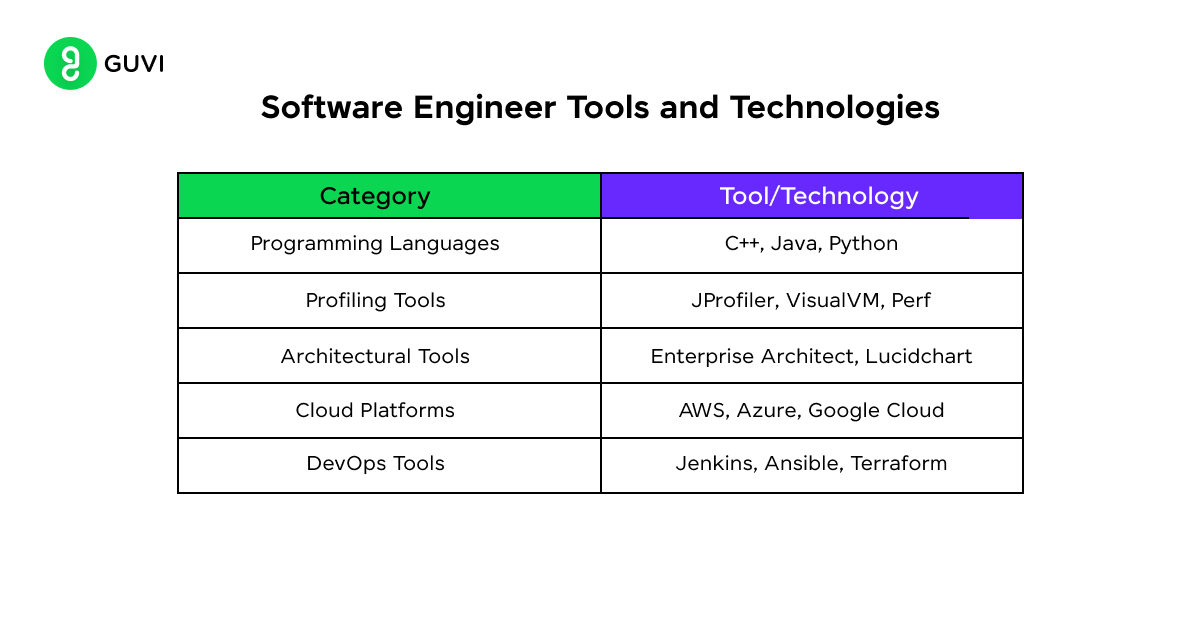
| Category | Tool/Technology | Function | Example |
| Programming Languages | C++, Java, Python | System-level programming, algorithm development | Writing optimized algorithms in C++ |
| Profiling Tools | JProfiler, VisualVM, Perf | Analyzing and optimizing application performance | Identifying memory leaks in a Java application with VisualVM |
| Architectural Tools | Enterprise Architect, Lucidchart | Designing and visualizing software architecture | Creating UML diagrams for a microservices system |
| Cloud Platforms | AWS, Azure, Google Cloud | Deploying and managing scalable cloud applications | Architecting a serverless application on AWS |
| DevOps Tools | Jenkins, Ansible, Terraform | Automating infrastructure deployment and management | Automating infrastructure provisioning with Terraform |
Career Path and Growth Opportunities
Full Stack Developer
- Typically begins with front-end or back-end development before expanding to the full stack.
- Skills Development: Learning HTML, CSS, JavaScript, and a server-side language like Python or Node.js.
- Mid-Level:
- Experience: At this stage, a Full Stack Developer should have several years of experience across the stack.
- Specialization: Can specialize in areas such as cloud computing, mobile app development, or advanced front-end frameworks like React or Angular.
- Responsibilities: Leading small teams, managing end-to-end project development, and ensuring code quality and performance.
- Senior Level:
- Role: A senior Full Stack Developer might transition into a tech lead or an architect role.
- Skills: Deep understanding of multiple programming languages, cloud architectures, and DevOps practices.
- Opportunities: Involved in decision-making for technology stacks, guiding development teams, and architecting solutions for complex problems.
Software Engineer
- Typically begins with a focus on a specific area like backend development, algorithms, or systems engineering.
- Skills Development: Strong foundation in computer science fundamentals, including data structures, algorithms, and system design.
- Mid-Level:
- Experience: Several years working on complex projects, possibly specializing in areas like cloud computing, machine learning, or cybersecurity.
- Specialization: Can choose to specialize in software architecture, performance optimization, or a specific technology stack.
- Responsibilities: Designing systems, optimizing performance, mentoring junior engineers, and contributing to the overall system architecture.
- Senior Level:
- Role: A senior Software Engineer might advance to a principal engineer, solutions architect, or engineering manager role.
- Skills: Expertise in system design, deep understanding of multiple programming paradigms, and experience in scaling systems.
- Opportunities: Driving technical vision for the company, leading large-scale projects, and making strategic decisions about technology direction.
Industry Demand and Salary Comparison
Demand
Both Full Stack Developers and Software Engineers are in high demand, but the specific needs can vary by industry.
- Full Stack Developer:
- Industries: Highly sought after in startups, SaaS companies, and tech firms where versatility and the ability to handle end-to-end development are crucial.
- Trends: The rise of microservices architecture and the demand for scalable web applications have increased the need for Full Stack Developers who can manage both client and server sides.
- Software Engineer:
- Industries: In high demand across various sectors, including finance, healthcare, and tech giants like Google, Microsoft, and Amazon.
- Trends: With the growth of cloud computing, AI, and machine learning, Software Engineers with expertise in these areas are especially valuable.
Salary Comparison
The table below provides a general comparison of average salaries in 2025 for Full Stack Developers and Software Engineers in major tech hubs.
| Location | Full Stack Developer (Avg. Salary) | Software Engineer (Avg. Salary) |
| Bangalore | ₹12 LPA – ₹18 LPA | ₹15 LPA – ₹22 LPA |
| Hyderabad | ₹10 LPA – ₹16 LPA | ₹12 LPA – ₹20 LPA |
| Pune | ₹9 LPA – ₹15 LPA | ₹11 LPA – ₹18 LPA |
| Mumbai | ₹11 LPA – ₹17 LPA | ₹13 LPA – ₹21 LPA |
| Chennai | ₹10 LPA – ₹15 LPA | ₹12 LPA – ₹19 LPA |
Takeaways…
In conclusion, both Full Stack Developers and Software Engineers play critical roles in the development and maintenance of software systems, each with its unique focus and required expertise.
Full Stack Developers offer versatility and the ability to manage end-to-end application development, making them invaluable in fast-paced environments like startups.
On the other hand, Software Engineers bring deep technical expertise, focusing on system design, optimization, and specialized development, which is essential for building scalable and robust systems in large organizations.
So basically, if you enjoy working across the entire stack, solving diverse challenges, and managing everything from user interfaces to databases, a career as a Full Stack Developer might be ideal.
Conversely, if you’re drawn to system design, optimization, and working on specialized projects, a Software Engineer role could be the perfect fit. Both paths offer lucrative opportunities, and the demand for skilled professionals in these roles continues to grow in 2025.
FAQs
A full stack developer has a broader skill set across front-end and back-end development, while a software engineer focuses more on designing and building software systems. The “better” role depends on project needs and individual career goals.
In India, software engineers typically earn slightly more than full stack developers due to their specialized expertise, although salaries can vary based on experience and company.
Yes, a full stack developer can work as a software engineer, especially in roles requiring both front-end and back-end development skills.
In India, full stack developers skilled in technologies like MERN (MongoDB, Express, React, Node.js) or MEAN (MongoDB, Express, Angular, Node.js) stacks tend to have higher salaries.
Yes, full stack engineers often use Python, especially for back-end development with frameworks like Django or Flask.

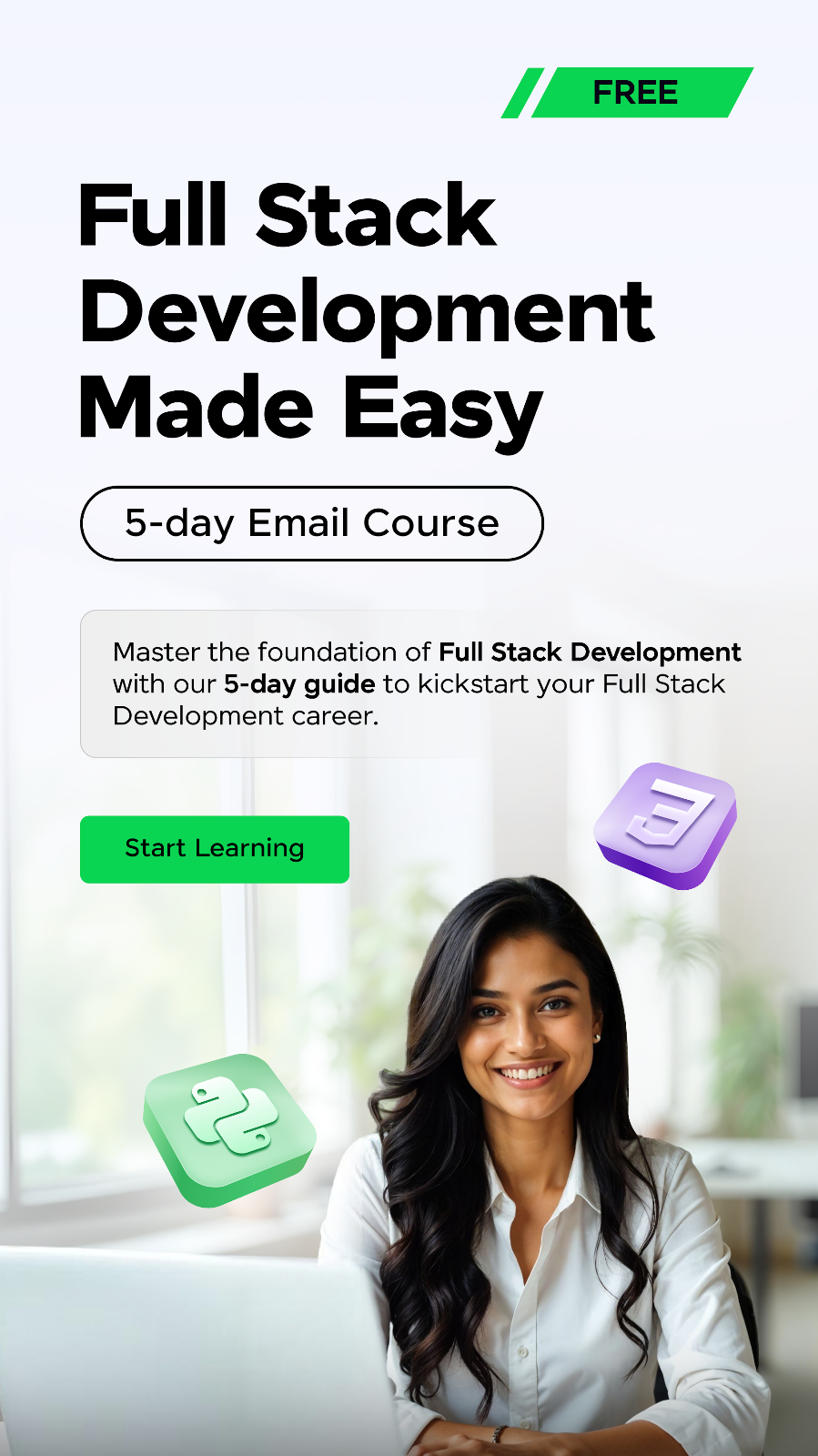









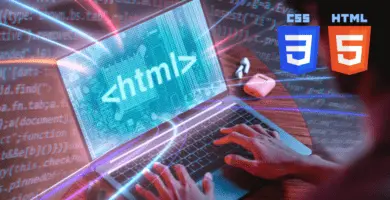










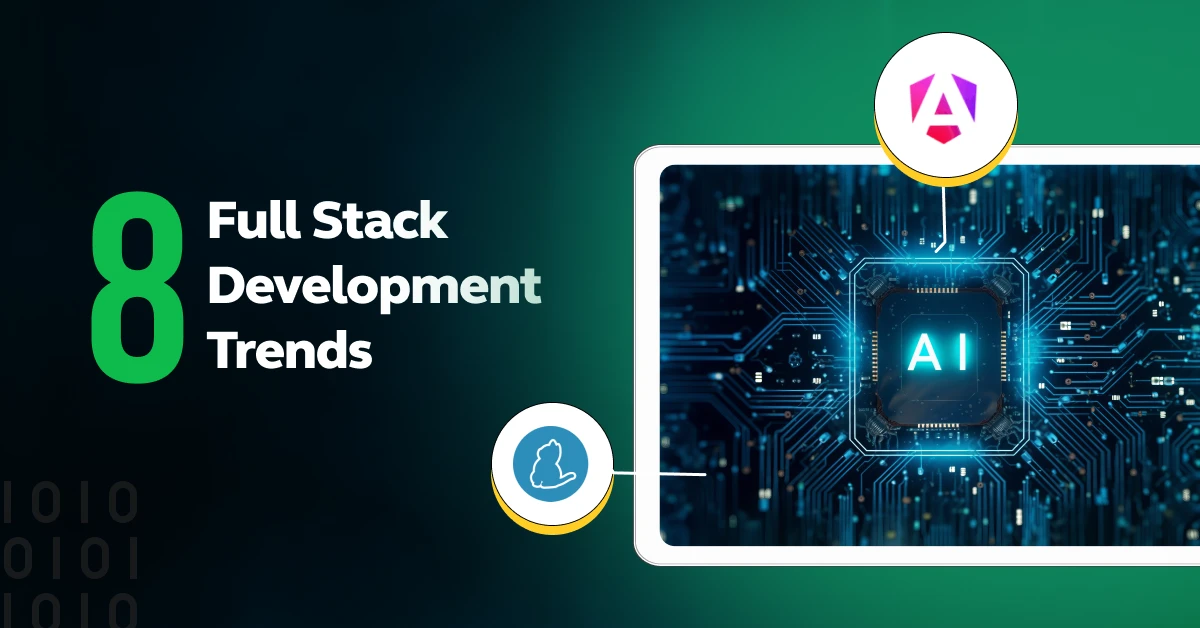
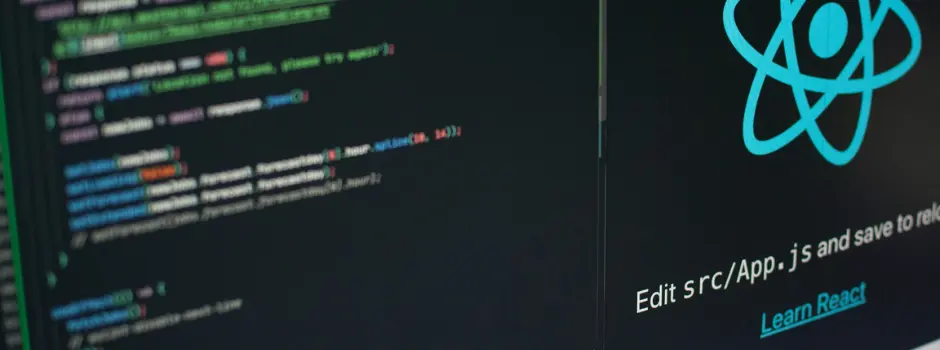
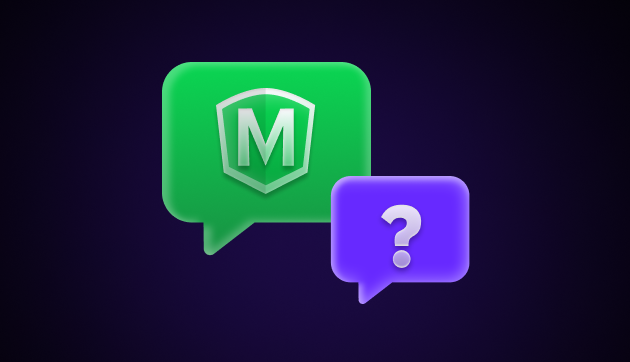
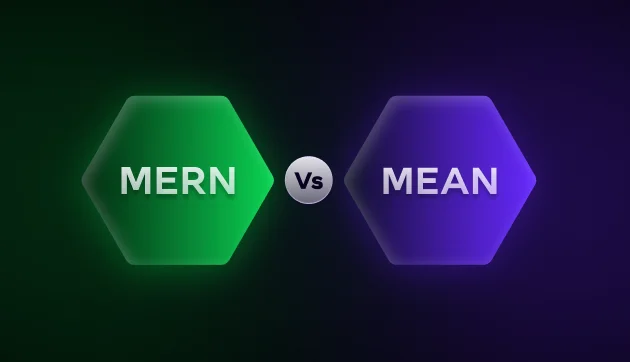


![Top 10 Coding Project Ideas for Beginners [With Source Code] 12 coding project](https://www.guvi.in/blog/wp-content/uploads/2024/05/Top-10-Coding-Project-Ideas-for-Beginners-With-Source-Code.webp)
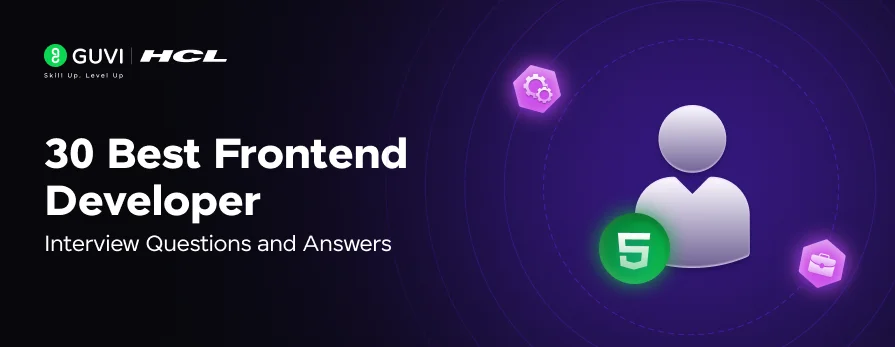


Did you enjoy this article?